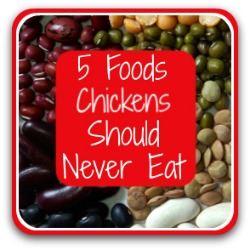Fermentation: what it is and why it's good for your chickens.
You may have heard of fermented food, but do you know how good it is for your flock?
We all want the best for our chickens – that goes without saying. There are some mixed reviews around the internet about whether fermenting food for poultry is beneficial for them or not.
In this article I'll untangle the pros and cons, based on proper research findings, so you can decide for yourself whether it's a good idea for your flock.
And in a follow-up article, I'll show you how to do it, step by step.
What exactly is fermentation?
If you've ever eaten yoghurt or cheese, you've eaten a food that's gone through a fermentation process.
Fermentation is simply a system of steeping solids in a liquid to release naturally occurring bacteria which are good for the health of the gut.
You've probably heard of probiotics. That's exactly what fermentation produces.
As well as making it hard for "bad" bacteria to survive in the gut, probiotics make food more digestible and increase the supply of protein available.
At the same time, the process increases the amounts of Vitamins K, C and B.
Are fermented foods healthy for chickens?
As you might guess from the information above, the answer is a resounding "Yes!", for both humans and chickens (and other animals too).
Bacteria are a vital part of our ability to digest and use foods. These days, medications such as antibiotics and the availability of fast foods can deplete the number of "good" bacteria our guts make naturally.
That means food is not absorbed as well as it might be, and our body loses out on the nutrients it needs to function healthily.
 That's Henrietta's head rushing to get to the fermented food before it's all gone!
That's Henrietta's head rushing to get to the fermented food before it's all gone!The net result is that we become more prone to infection and illness.
Fermentation increases the number of bacteria so that our guts are literally teeming with them. While that may not sound very pleasant, it's exactly what we need.
And it's no different for chickens.
What are the specific benefits for chickens?
Here are some of the benefits studies about using fermentation specifically for chicken feed have concluded (for my sources, see here):
- It increases healthy bacteria in the gut, which makes food easier to digest.
- Because of that, food is used more efficiently. Specifically, vitamins and minerals are more easily absorbed. So less food is used to better effect, meaning your chickens need to eat less to maintain the same – or improved – levels of health, and better quality eggs.
- The lactic acid content of fermented food creates an environment in which harmful bacteria can't survive.
- So it increases the chicken's resistance to infection, and forms a natural barrier to protect against, for example, the Salmonella bacteria(4).
 Even very young chicks can eat fermented food.
Even very young chicks can eat fermented food.- Additionally, fermented foods have been shown to increase the strength of egg shells and the weight of eggs.
- Its high protein content makes it particularly good for chickens suffering from stress due to, for example, extreme cold during the winter, moulting, post-predator attack or illness.
- It's been shown to decrease behaviours such as bullying and feather pecking(2).
- It's excellent for for new chicks. The protein aids growth and the liquid content keeps them hydrated.
The most important benefit of fermentation.
Probably the most important benefit of fermentation is the resistance to infection which fermented foods provide.
In fact, they're so efficient at preventing infection that in commercial livestock rearing where antibiotics aren't allowed or aren't wanted, fermented foods are used as a matter of course to keep animals, including chickens, healthy.
And studies have consistently shown that the mortality rate amongst chickens fed fermented feed is lower(e.g. 2).
So feeding your chickens fermented food can actually prolong their life.
Does fermenting save money?
It certainly can. Adding liquid to feed increases its volume, so chickens will need less of it to fill their stomachs.
But more importantly, because fermented food is more easily and efficiently absorbed, chickens need less of it - some articles(1) claim as much as 20% less - to have the same, or a more, beneficial effect.
And, of course, because it's more solid than grain, it's not as easily kicked out of feeders. So you'll use less feed that way, too.
Are there any drawbacks?

- The fermentation process can have varying outcomes. A consistent temperature is needed for the best results.
- Chickens can take time to get used to the taste. It's best to introduce fermented foods while they're young chicks.
- There's some evidence from research(1) that, as with any high protein food, fermented foods can increase chickens' weight, particularly in poultry bred for their meat.
- That can be a positive benefit in chickens who've been ill, for example, or to help through the moult, but it can also lead to health issues. Fat chickens are not healthy!
- There was evidence in one trial of the feed itself becoming contaminated(5), but that was found to be a problem with the quality of the feed and the process, not the fermentation itself. It transpired that the fermented feed was was for too long in plastic, airtight containers.
- As long as you use a good quality feed, keep the fermenting foods in a good quality container, follow instructions and allow your chickens time to get used to it, there really shouldn't be any problems.
How to ferment feed for chickens in four easy steps.
If you're convinced by the research and want to try fermenting some feed for your flock, take a look at my follow-up article.
Fermentation is not a difficult process, but there are certain conditions which must be met for it to be successful.
The article goes into detail about what those conditions are: best containers, foodstuffs which ferment well, how to do it for best results, and how and when to feed to your flock.
If you'd like to know more about healthy, natural foods for chickens, these pages will help.
Sources.
A lot of "facts" you'll find on the internet are often people's individual views, based on inaccurate information repeated from poor quality sources.
The information I provide in this article and others is based not just on my own experience, but on evidenced facts from scientific, peer-reviewed research and books from highly respected and experienced poultry keepers such as Gail Damerow.
Some of the trusted sources I have used in this article are these.
1. Engberg et al: 'Fermented feed for laying hens: effects on egg production, egg quality, plumage condition and composition and activity of the intestinal microflora'. Pub U.S. National Library of Medicine, March 2009.
2. Steenfeldt, S, et al: Effect of feeding silages or carrots as supplements to laying hens on production performance, nutrient digestibility, gut structure, gut microflora and feather pecking behaviour. Pub. Journal of British Poultry Sciences, 2007.
3. Beal, Niba et al: 'Potential of bacterial fermentation as a biosafe method of improving feeds for pigs and poultry'. Pub. African Journal of Biotechnology, May 2009.
4. Heres, L. et al: Passage of Salmonella through the crop and gizzard of broiler chickens fed with fermented liquid feed. Pub. Journal of Avian Pathology, 2003.
5. Centers for Disease Control and Prevention, US: 'Why does Alaska have more botulism?'

















